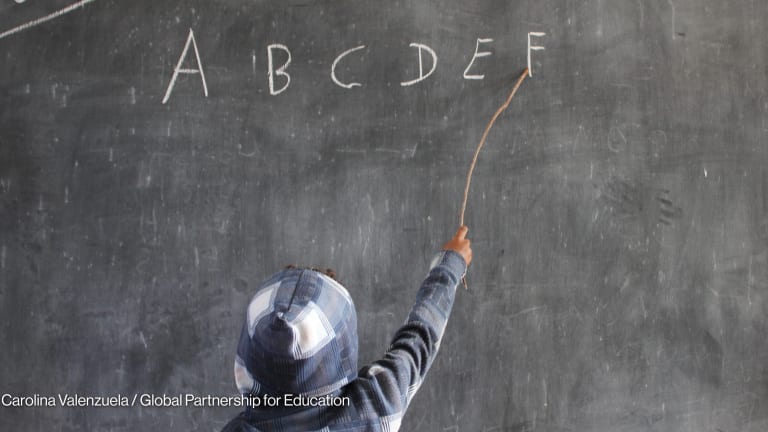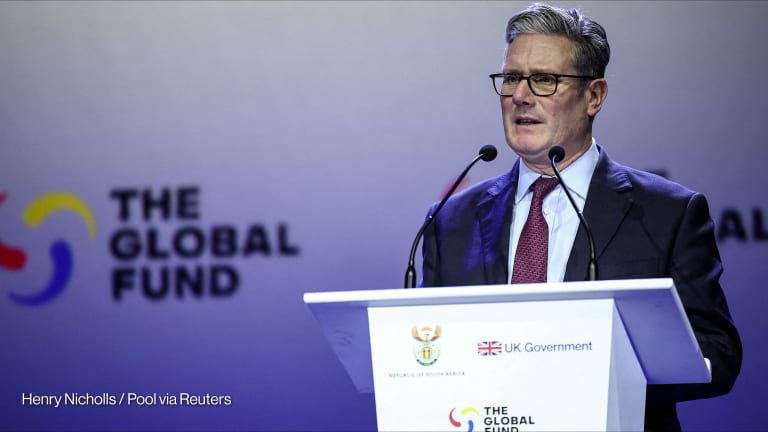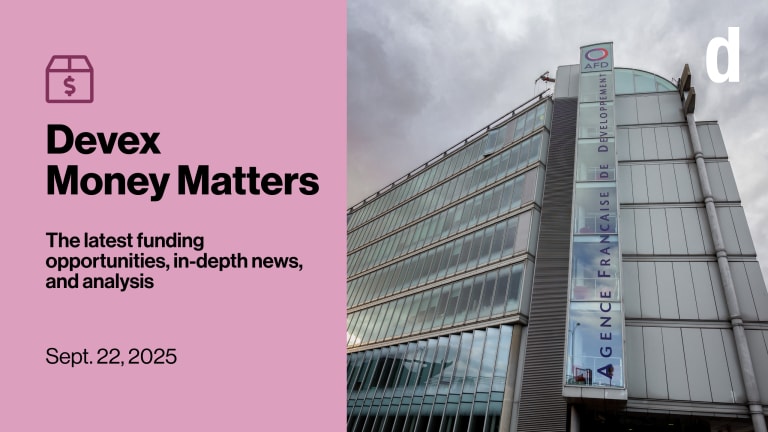
DIAMNIADIO, Senegal — Attendees at the Global Partnership for Education replenishment conference here expressed mixed emotions over the $2.3 billion garnered in commitments on Friday, which falls below the projected target of raising $3.1 billion for the 2018-2020 financing cycle.
If fully funded, the GPE would have afforded nearly 20 million additional children with the chance to complete primary school, trained 1.7 million teachers and built over 20,000 classrooms.
See more Devex coverage of the GPE:
► Education financing, during emergencies, quality top discussions at GPE replenishment conference
► Civil society "surprised and disappointed" as DFID's GPE pledge falls short
Some participants saw this year’s conference as progress from years past, with more attendees present than ever before. For the first time, a recipient country hosted the international meeting with France offering its support as co-host. Donor commitments substantially increased as compared to the $1.3 billion contributed over the past funding period.
“We are seeing a clear trend to seriously address the global learning crisis” said Julia Gillard, board chair of the GPE and former prime minister of Australia. “The success of the conference marks a turning point for global political support for education financing, and brings a new breadth and depth to our partnership.”
Overall, while the GPE replenishment did not meet its goal, it is still expected to improve the quality of, and provide access to, education for millions of the estimated 264 million children out of school and the millions of others that are not learning due to underfunded school systems and inadequate learning conditions.
R&B singer and GPE Global Ambassador Rihanna attended the high-level discussion delivered by African heads of states Friday afternoon and commended the “tremendous progress made” but insisted “the work is never done until every boy and girl has access to education.”
Following the closing ceremony, Devex spoke with Camilla Croso, board president for the Global Campaign on Education who expressed optimism about the event and the chance of future progress. “Though we haven’t reached the expected [donor] target, we have increased enormously if you compare to the last replenishment, so we think that there’s an incredible amount of energy in the international community,” she said. However, her focus going forward will be tracking pledge commitments, a downfall to the last replenishment where some pledges were never received.
Others, however, were not as satisfied with the meeting’s results.
“Sadly, the much-anticipated breakthrough in donor financing for global education that is so urgently needed didn’t materialise in Dakar,” Save the Children head of education, policy, and advocacy, Joseph Nhan-O’Reilly told Devex in a reaction statement.
“The failure of donors to fully fund GPE over the next three years will deny real children the opportunity to go to school, which is a missed opportunity for them, for their communities and for the international community, who had the chance to improve the lives of some of the world’s poorest children,” he wrote.
Financing education remains a challenge in the development space, where education’s share in development aid has fallen every year since 2009, and is currently less than 6 percent of all development expenditures. The GPE expects that international finance for education will need to rise from $16 billion in 2015 to upwards of $90 billion in 2030 in order to adapt to rising needs.
Here are the top commitments and announcements made at this year’s GPE conference.
Developing countries greatly increase domestic funding towards education
A key highlight of this year’s conference was the commitment of low- and middle-income countries to utilize domestic resources to fund their education systems. In total, 53 developing country partners pledged to increase their public expenditures to education for the 2018-2020 period to a total of $110 billion, up from the $80 billion pledged during the previous funding cycle.
Former GPE board member and ActionAid head of program development, David Archer, believed the round of fundraising fared better than some expected on the whole, but not as much as others would have hoped.
“The big story is the developing countries pledging, as it puts in the shade the $2 billion pledged by donors,” Archer said following the announcements on Friday.
In fact, developing countries pledged 13 times more than the donor countries. “That is excellent because we believe in domestic financing in terms of sovereignty,” Crosso explained. “It’s critical that the countries are the ones raising the money and deciding where and how they want to invest and in what direction.”
Many countries also agreed to increase the national government expenditure on education up to and, in some cases, beyond the 20 percent of national budgets as suggested by the World Bank. Tanzania, for example, pledged 473 billion Tanzanian shillings ($210.9 million), or 22.5 percent of public expenditure. Zimbabwe also committed to improving its quality of education through a community-based curriculum framework and three-year trajectory to increase government spending from 35 to 39 percent of national expenditure by 2020. Caribbean countries collectively pledged a $3.6 billion GPE contribution for the 2018-2020 funding cycle, with countries like Grenada and Guyana agreeing to exceed 20 percent budget allocations.
“The most passionate of all [the presidential announcements] was from [the] president of Ghana calling for Africa to finance its own education,” Archer argued. Ghanaian President Nana Akufo-Addo’s speech was met with widespread support as he emphasized the importance of domestic resource mobilization to fund education by eliminating illicit financial flows, tackling corruption and mismanagement of resources. He also pledged to expand free education to include primary and secondary education.
Senegal also made history by becoming the first African donor with a $2 million commitment to the GPE replenishment.
Some donor pledges not as much as expected, some stepped up
However, some donor countries, including the United Kingdom, disappointed some education advocates, as civil society groups had pushed for a 350 million British pounds ($499 million) commitment from the U.K. Although, their 225 million pounds ($320 million) pledge represents a 50 percent increase since the last replenishment, education supporters argued that it was not enough.
“The U.K.’s decision to increase their contribution by 50 percent is welcome … however, we are disappointed that this wasn’t enough to help meet the partnership’s overall target,” Nhan-O’Reilly included in his statement to Devex. “The U.K. could have gone further today and helped set a higher ambition for the international community.”
Ireland and Canada also announced plans to double their current contributions to the fund, while Norway, Denmark, Sweden, and Switzerland increased their contributions as well. The United States pledged $75 million for the 2018 fiscal year, with “hopes that Congress appropriations will allow for more donations before the end of the funding cycle,” U.S. Agency for International Development Senior Deputy Administrator of the Bureau for Economic Growth, Education, and Environment Michelle Bekkering announced.
The largest donor of this funding cycle was the European Union with its 337.5 million euro ($420.3 million) pledge.
Co-host France pledged 200 million euros ($249 million), with another 100 million euros ($124.5 million) earmarked for education funding through the French Development Agency. Macron defined education as the opportunity given to each one of us to choose our way of life and build a society.
Spain and the Netherlands returned to the partnership as donors this year, and the United Arab Emirates pledged $100 million to the GPE, making it the partnership’s first Arab and Middle East donor.
Private donor foundations pledged $5.7 million, including philanthropic and foundation contributions.
Though Friday’s announcements didn’t reach campaign targets, several donor countries have expressed their intention to pledge further funds over the course of the financing period and education advocates hope they keep their promises which would help improve the livelihoods of the world’s future generations.
Read more Devex coverage on education.








